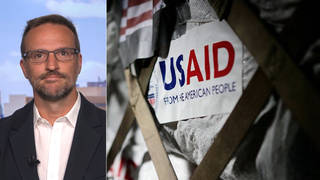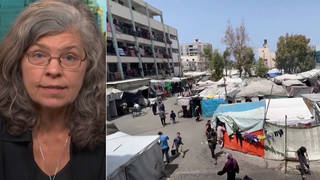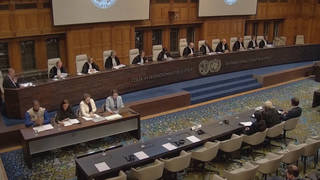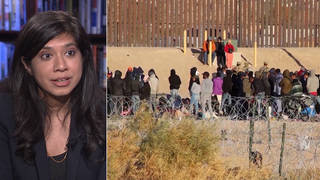
Related
Guests
- Belkis Willeassociate director with the Crisis, Conflict, and Arms Division at Human Rights Watch.
A new Human Rights Watch Report finds Israeli forces have attacked humanitarian aid convoys and facilities at least eight times since October 7 despite being given their coordinates. Israeli authorities did not issue advance warnings to any of the aid organizations before the attacks, which killed at least 15 people, including two children, and injured at least 16 others. More than 250 aid workers have been killed in Gaza over the past seven months, according to the United Nations. “Aid workers, unfortunately, die in conflict zones,” says HRW researcher Belkis Wille. “What’s really unique in the context of Gaza is the high number in such a short period of time.”
Wille also discusses a recent U.S. government report that found Israel has likely violated international law in its assault on Gaza but that it could not make that conclusion definitively — a “shocking” finding, she says. “The United States absolutely has to start doing more to limit military assistance to Israel. … And it needs to do far more to protect civilians more broadly.”
Transcript
AMY GOODMAN: This is Democracy Now!, democracynow.org, The War and Peace Report. I’m Amy Goodman, with Nermeen Shaikh.
NERMEEN SHAIKH: Israeli forces have attacked humanitarian aid convoys and buildings in Gaza at least eight times since October, despite being given coordinates to ensure their protection. That’s according to a new report by Human Rights Watch published this week. Israeli authorities did not issue advance warnings to any of the aid organizations before the attacks. In the eight incidents documented by Human Rights Watch, Israeli forces killed at least 15 people, including two children, and injured at least 16 others. More than 250 aid workers have been killed in Gaza over the past seven months, according to the U.N.
AMY GOODMAN: For more, we’re joined by Belkis Wille, associate director with the Crisis, Conflict, and Arms Division at Human Rights Watch, their new report titled “Gaza: Israelis Attacking Known Aid Worker Locations.” Belkis Wille is joining us from the capital of Ukraine, in Kyiv. And we’re going to talk about Ukraine in a minute, but first Gaza.
Belkis, thanks so much for being there. Can you describe what you found? You know, it’s interesting that in the last few days, yet another U.N. worker was killed, and Israel claimed that they weren’t given the coordinates of where they were. But if you can talk about the fact that when they know the coordinates, these places, these aid workers and areas are attacked?
BELKIS WILLE: Absolutely. You know, in armed conflicts around the world, there’s something known as a humanitarian deconfliction system. This is a system employed where aid organizations, U.N. agencies will transmit to the warring parties GPS coordinates of their locations, both moving convoys and fixed locations, like guesthouses where their staff are sleeping, or, you know, hospitals, other facilities where they’re operating. And the intention of transmitting those coordinates is to ensure that those locations do not come under attack, because this is where aid activities are being carried out.
And what’s really striking in the context of Gaza and these military operations is how many times we’ve seen attacks on aid workers, whether it’s in their guesthouses or, again, as they’re moving in convoy, where those attacks come exactly at the locations that the Israeli authorities know about. In some cases, these were convoys that actually took the routes that the Israeli military told them to take, and they were still bombed, with some people being killed, along those routes with no prior warning.
NERMEEN SHAIKH: And, Belkis, if you could just give us, you know, a comparative sense: How effective is this deconfliction system in other war zones that you’ve worked in? And then talk about some of the incidents that you document in this report, the attacks on convoys, from Doctors Without Borders to the International Rescue Committee, the World Central Kitchen and so on.
BELKIS WILLE: Absolutely. You know, aid workers, unfortunately, die in conflict zones. That’s not something unique. But I think what’s really unique in the context of Gaza is the high number in such a short period of time. As you said earlier, over 250 aid workers have been killed since October in Gaza. That is extremely high. I cannot think of seeing a number that high in any other conflict that I’ve worked on in that same period of time.
Deconfliction is a process that normally works. And sophisticated militaries have a way of doing deconfliction effectively when they want to do it effectively.
In this report, we look at various incidents. As you said, there were attacks on guesthouses of Doctors Without Borders, MSF, and indeed one of their convoys. There was also one particularly egregious attack. It was on a guesthouse of a medical team that was a joint team of an NGO called MAP and IRC — IRC, the International Rescue Committee — and this guesthouse was surrounded by nothing. It’s near the beach, so it was just sand all around the building — no other buildings, no vehicles. And there was a massive airstrike on the wall next to the guesthouse. It blew through the wall. It damaged the guesthouse significantly, injured people inside. And this, again, was an incident where we know both MAP and IRC had multiple times shared their coordinates directly with the Israeli authorities, with the U.N., which shared it with the Israeli authorities, and even with the British government, which shared it with the Israeli authorities. And yet they came under attack.
NERMEEN SHAIKH: And if you could talk about, Belkis, I mean, all of this happening in the context of this massive humanitarian crisis unfolding in Gaza? Human Rights Watch has also accused Israel of using starvation as a weapon of war. If you could talk about that, as well as the attacks on health facilities, on so many hospitals in Gaza in the last seven months?
BELKIS WILLE: Absolutely. As you said, it’s so important to see these attacks within the broader context. Every single aid group that we have spoken to that is operating right now inside of Gaza, those that came under attack and those who are also operating in Gaza and fearful of coming under attack, have told us very clearly that these attacks on aid workers have significantly limited their ability to meet the ongoing famine in some areas, as you said, impending famine in others. They’re so worried about their own staff being killed that they’re actually having to decide to send less people into Gaza, knowing that they’re opening them up to the risk of being killed, and, when inside Gaza, severely limiting their movements and minimizing their aid footprint, just so that they can minimize the chance of coming under attack. As you said, these attacks have hit hospitals. We’ve also seen a severe restriction put in place by the Israeli military preventing aid organizations and the U.N. from bringing aid directly to northern Gaza, where the humanitarian situation is by far the worst.
NERMEEN SHAIKH: And, Belkis, let’s talk about the support that Israel continues to receive from the U.S. despite the fact that a recent long-awaited State Department report has laid out several suspected international human rights violations by Israel and says that Israel likely used U.S.-supplied weapons in, quote, “incidents that raise concerns.” And yet, despite this report, the Biden administration suggests no changes in policy or any consequences against Israel. What are you calling on the U.S. to do?
BELKIS WILLE: Well, first, to take that report head-on, frankly, it is surprising to have seen this conclusion that the U.S. government does not have enough information to be sure whether violations of international humanitarian law have occurred, specific ones. Human Rights Watch, Amnesty International, Oxfam and many other organizations provided hundreds of pages of evidence to the U.S. government exactly about international humanitarian law violations being conducted by Israel in Gaza.
And this report also said that it could not determine and did not have enough information about whether Israel was blocking aid into Gaza or these violations of international humanitarian law. That is shocking coming from the U.S., such a close partner to Israel, that surely should have access to this kind of information, including their rules of engagement, including the obstacles being put in place on aid coming in and out of the country.
As you said, the United States absolutely has to start doing more to limit military assistance to Israel. We’re calling on an arms embargo on all warring parties because of the violations being carried out. And it needs to do far more to protect civilians more broadly.
AMY GOODMAN: Belkis Wille, we want to have you stay with us, associate director of the Crisis, Conflict, and Arms Division at Human Rights Watch. We’re going to link to your report on Gaza.
When we come back from break — I mean, you’re in Kyiv, in the capital of Ukraine — we’re going to talk about Russian forces executing surrendering Ukrainian soldiers and also look at Human Rights Watch’s reports on Sudan, ethnic cleansing, possible genocide. Stay with us.











Media Options